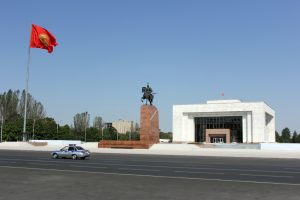A 1999 book referred to Kyrgyzstan as an “island of democracy”; it’s a title that has been repeated in the 20-plus years since with various degrees of consternation by analysts exhausted by the tumultuous waves of Kyrgyz politics. In comparison to its neighbors, Kyrgyzstan certainly appears on the surface to be far more democratic, having run through six presidents in the time neighboring Uzbekistan and Kazakhstan have had two each, and Tajikistan just one.
In the wake of Kyrgyzstan’s third revolution, in which street protests in October 2020 following a botched parliamentary poll served as a launching pad for Sadyr Japarov’s astronomical rise from prisoner to president, the shine on the phrase “island of democracy” has faded considerably. Japarov’s unusual rise to power has been complemented by a backslide typified by intolerance of dissent and state pressure on the media.
Kyrgyzstan’s political arena, once so celebrated, has become increasingly constrained. In the following interview with The Diplomat’s Managing Editor Catherine Putz, Dr. Aijan Sharshenova, a Bishkek-based political analyst, explains how the Kyrgyz government has increased pressure on political opponents and the media and assesses Kyrgyzstan’s biggest challenges.
Last October, Kyrgyz authorities arrested more than two dozen politicians, activists, and others, alleging a coup plot in connection to their agitation against the Kempir-Abad agreement with Uzbekistan. In the months since, Kyrgyzstan and Uzbekistan signed the border agreement. Yet the authorities continue to pursue criminal cases against the agreement’s opponents. Is there more going on here? Why did the Japarov government react so harshly to this dissent?
A lot more politicians, civil society activists, and influencers have spoken against the Kempir-Abad agreement with Uzbekistan last year. I would not name their names for obvious reasons – I would not like to be somehow responsible for their persecution.
The detainees remain imprisoned due to some obscure political or personal reasons. Objectively speaking, they hardly represent an existential threat to Japarov’s rule. There are no upcoming presidential or parliamentary election any time soon. They are not likely to mobilize a serious, sufficiently (financially or otherwise) motivated, crowd to topple the current government. They are too conscious to enter murky deals with the underworld or kleptocrats, who could actually topple the current government. I do not think they have significant foreign backing either, or that any external actors are interested much in yet another Kyrgyz revolution. In other words, they do not represent a plausible threat to Japarov and his government.
The charges against them are quite strange, too. They were originally arrested for the intent to organize “mass unrest,” which is quite difficult to imagine given the current protest fatigue in Kyrgyzstan. The legal process is taking a long time; it seems to be stalled regularly. The details of the mysterious investigation that led to that mass detention are unclear. From January this year, the investigation and its materials are classified too, so there is little chance to understand on which grounds these 20+ people were arrested.
Given these facts, it is possible to conclude that the detention is somehow a whim of those in power, who are either trying to make a public example of this case or have something against these detainees personally.

































